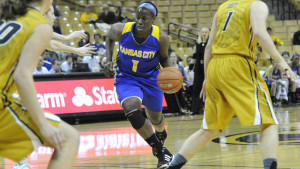This story appears in FCA Magazine’s May/June 2015 issue. Subscribe today!
We’ve all witnessed it in one capacity or another.
A game that’s been chippy all night, literally on the verge of an all-out brawl. One too many shoves after the whistle, and the referee quickly whips out his flag to keep things from escalating. Or the manager arguing calls from the dugout who decides the umpire needs a little closer explanation of the strike zone.
Athletics are all about emotion. The attractive side lies in the exhilaration of competition, candid outbursts, outcomes, and the down-to-the-wire intensity of a win-or-lose moment. Competitors live off the pressure that can send them soaring or sprawling in a split-second’s time. Emotions can fuel us, but they can also so easily spin us out of control. In both beautiful and detrimental ways, they showcase the vibrant life God created in each individual, building passions that are integral to well-being.

Emotions can take over normal calmness and charge coaches and athletes to boldly compete for Him, or they can become a stumbling block when left unchecked.
Emotions can take over normal calmness and charge coaches and athletes to boldly compete for Him, or they can become a stumbling block when left unchecked. We’re the only creatures made in God’s image, and the Bible is filled with wisdom on handling our emotions.
“Refrain from anger and give up your rage; do not be agitated—it can only bring harm.” – Psalm 37:8
“A patient person shows great understanding, but a quick-tempered one promotes foolishness.” – Proverbs 14:29
“I say then, walk by the Spirit and you will not carry out the desire of the flesh. For the flesh desires what is against the Spirit, and the Spirit desires what is against the flesh; these are opposed to each other, so that you don’t do what you want.” – Galatians 5:16-17
“All bitterness, anger and wrath, shouting and slander must be removed from you, along with all malice.” – Ephesians 4:31
So, how do Christ-following athletes and coaches practice godly self-control in the midst of highly competitive and emotional environments? How do we look to Him for peace when everything is pleading for us to do otherwise?
*****
Emotions are usually fine when you’re on the winning side. It’s when games don’t turn out as planned that they can cause even the most poised to lose control. No one is immune to the pressures of the moment, especially the person sitting at the top—the head coach.
Mark Stroud, head football coach at Calvary Day High School in Savannah, Ga., admitted that even for coaches, the heat of the game can swiftly overtake rational thinking. He remembered one particular moment this past season in a game where, following a score, the opponents returned the kickoff for a touchdown. Visibly upset as he paced the sidelines, Stroud’s expression began the swing in momentum to the opponents’ side.
“I could not let it go,” he said of the kickoff return. “I had to come in at halftime and say, ‘Hey, look, guys, I’m sorry. I reacted very poorly to this situation, I didn’t handle it correctly, and I feel I caused us to lose our center of focus.’”
As Stroud’s example proved, stubbornness from the top has a trickle-down effect. There’s almost always a chain reaction, particularly when it comes to officiating. Question a referee’s ruling, and immediately players and fans believe they have free reign to do the same. In the blink of an eye, an entire team can lose sight of the overarching reason they’re even there.
“You have to be careful of [the initial reaction],” Stroud said. “You have to guard yourself to not have an outburst, to not lose your cool, to not blame officials or someone else. Ultimately, as head coach, it’s your responsibility to handle the emotional well-being of your team.”
Think of some of the more famous “successful” coaches in today’s sports world. Names like Mike Krzyzewski, Bill Belichick or Gregg Popovich probably come to mind. Now, how often do they explode on an official or lose their cool in front of their team? The answer isn’t “never,” but it’s awfully close.
A coach is going to handle an adverse situation one way or another—by sending a really poor message or a really good one. A coach has the privilege and responsibility to dictate how a team performs and reacts. In a very real sense, the way they handle themselves is a form of control over their team.
“For me personally,” Stroud said, “it’s about getting kids to play to a standard.”
Having the humility and discipline to learn to be sacrificial, making less of themselves and more of the team, is paramount. If the roar of the ruckus gets too loud as a coach, it’s never too late to take a step back, call timeout, pause from the action for a moment and refocus. There are many things that can’t be controlled in a game, but coaches can always control attitude, effort, approach, and how he or she instructs a team to behave on the field.
*****
When former University of Missouri-Kansas City basketball star Kim Nezianya began her college career in 2010, her attitude often led to emotional outbursts dictated by her performance on the court. She wasn’t saved, which in her opinion translated to a self-seeking, performance-prone outlook each game.
“When I came into college, I wanted to be the best,” she said. “I was a very selfish player. If I didn’t do well, I was angry. If I was doing well, then everything was good. And when I played, you could tell that’s how I felt.”
Coming to Christ her junior year, Nezianya began to see her performance as an act of worship, an encouragement opportunity, and a way to show Jesus to her teammates.

After accepting Christ, former University of Missouri-Kansas City star Kim Nezianya left the pressure to perform behind and competed with freedom and joy.
“You could see my joy for basketball and how I interacted with my teammates was completely different,” she said. “Basketball is a game of runs. You have highs and lows, so it’s very easy to kind of get caught up in that and feed off the emotions in good and bad ways. It naturally pushes you to be emotional.”
But the thematic key is to keep in communication with the Lord for an even keel. Before games, Nezianya spent time in Scripture and prayed to get in the right mindset. Simple, small things like submitting to God instead of making the game about her helped her keep a more eternal perspective. She recognized the platform she held as a Christian athlete—center stage, where people see each and every action and reaction.
“In the joy you have for the game or in the moments where you’re down, however you react, people can see Jesus through that,“ she said. “Your perspective on how you play is going to be different.
“If you think you’re playing for your coach, then whenever your coach yells at you, you think you stink. But if you keep the perspective that you’re playing for God and have that ‘If I gave everything I had and I put it all on the court, then that’s enough’ mentality, it will help you stay more focused on the good things than the bad.”
*****
In most cases, an emotional response is not the most reliable one. Acting strictly out of emotion is usually a selfish move in any team-sport scenario. In a healthy, on-field atmosphere, the well-being of the team is of much more importance than the individual. When emotions boil over from an athlete or coach, it’s a nonverbal statement that he or she elevates himself or herself to be the most important person on the field.
“You’ve taken the idea that your team is more important than yourself out of the equation,” Stroud said. “When you don’t handle your emotions and they go negative, it’s like a wave through the rest of the team; it infiltrates everyone. Plus, you’re putting your team in jeopardy with penalties.”
The result? Athletes believing they have to make the play, win the game or solely take on circumstantial pressure, which is a heavy burden to bear.
“A kid can get very explosive and upset because he doesn’t want to let his teammates down; he wants to be successful in what he’s doing,” Stroud said. “If you’re going to allow your life to be judged by worldly standards, then I think you’re always going to be emotional and sometimes in a very negative way because of the pressure to be successful. However, if you’re coming from a Christ-centered worldview, you know that the scoreboard cannot judge you, your life, or your performance.”
Keeping cool in the wake of wavering emotions comes from being anchored in the Word, where an athlete or coach has freedom and power over their mind, will and emotions. It wasn’t exactly athletics, but remember how Jesus—entrenched in the Word and in complete unison with His Father—behaved during some of the most high-stress, pressure-packed moments in the history of mankind.
By comparison, it might help to remember the purpose of athletics in the first place.
“Playing sports is supposed to be something that brings you joy and makes you excited,” Nezianya said.
The excitement for simply playing a game is a gift, one that fits into the slideshow of life that flashes new memories each day. When the competition gets cruel, elbows flailing and crowd screaming, those anchored in Christ can keep poised and listen to the voice of reason rather than revenge.
“Peace I leave with you,” Jesus whispers in John 14:27. “My peace I give you.”
There, in the central vein of our circumstance, is the hand that gives hold to our hearts and stays our course.
–This article appears in the May/June 2015 issue of FCA Magazine. To view the issue in its entirety digitally, click here: May/June 2015 FCA Mag Digital
–Want FCA Magazine in your home or business? Subscribe here: fca.org/orderthemag
–For daily faith and sports content follow @FCAMag on Twitter (www.twitter.com/fcamag) and “Like” FCA Magazine on Facebook (www.facebook.com/fcamag).
Photos courtesy of Thomas Barwick, Ostill, Dreamstime.com, and Dennis Hubbard/UMKC Athletics